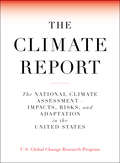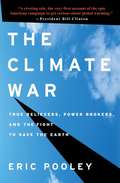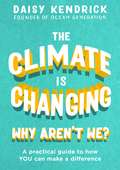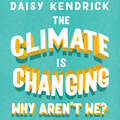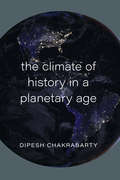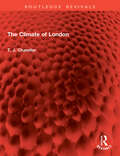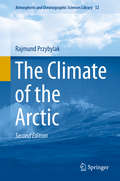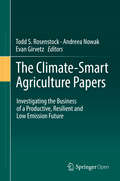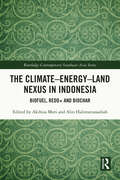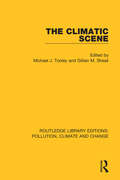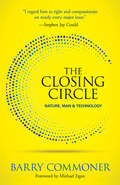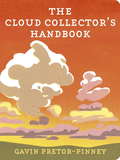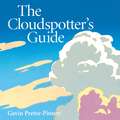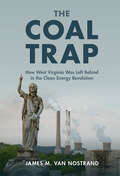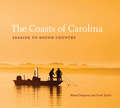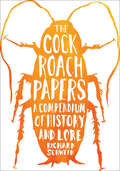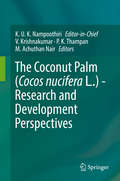- Table View
- List View
The Climate Report: National Climate Assessment-Impacts, Risks, and Adaptation in the United States
by U.S. Global Change Research ProgramTo hide its dramatic findings, the government released its mandated Climate Assessment Report on Black Friday while everyone was out shopping. Melville House is rushing the report into print - including all its charts, graphs, and illustrations - to broadcast its meticulous and devastating findings about the causes and impact of global warming.The U.S. Global Change Research Program (USGCRP) is mandated by law "at least every four years ... to submit to the President and the Congress an assessment regarding the findings of ... the effects of global change, and current and major long-term trends in global change." This year, the report was released in the wake of a series of some of the most devastating hurricanes in American history, as well as the horrific California wildfires. As the report says, "The assumption that current and future climate conditions will resemble the recent past is no longer valid."Detailing not only the devastating impact of global warming on the environment, but health issues leading to tens of thousands of deaths per year, and economic losses of tens of billions of dollars, the report concludes that "The evidence of human-caused climate change is overwhelming and continues to strengthen, that the impacts of climate change are intensifying across the country, and that climate-related threats ... are rising."
The Climate War: True Believers, Power Brokers, and the Fight to Save the Earth
by Eric PooleyIn The Climate War, Eric Pooley--deputy editor of Bloomberg BusinessWeek--does for global warming what Bob Woodward did for presidents and Lawrence Wright did for terrorists. In this epic tale of an American civil war, Pooley takes us behind the scenes and into the hearts and minds of the most important players in the struggle to cap global warming pollution--a fight in which trillions of dollars and the fate of the planet are at stake. Why has it been so hard for America to come to grips with climate change? Why do so many people believe it isn't really happening? As President Obama's science advisor John Holdren has said, "We're driving in a car with bad brakes in a fog and heading for a cliff. We know for sure that cliff is out there. We just don't know exactly where it is. Prudence would suggest that we should start putting on the brakes." But powerful interests are threatened by the carbon cap that would speed the transition to a clean energy economy, and their agents have worked successfully to deny the problem and delay the solutions. To write this book, Pooley, the former managing editor of Fortune and chief political correspondent for Time, spent three years embedded with an extraordinary cast of characters: from the flamboyant head of one of the nation's largest coal-burning energy companies to the driven environmental leader who made common cause with him, from leading scientists warning of impending catastrophe to professional skeptics disputing almost every aspect of climate science, from radical activists chaining themselves to bulldozers to powerful lobbyists, media gurus, and advisors in Obama's West Wing--and, to top it off, unprecedented access to former Vice President Al Gore and his team of climate activists. Pooley captures the quiet determination and even heroism of climate campaigners who have dedicated their lives to an uphill battle that's still raging today. He asks whether we have what it takes to preserve our planet's habitability, and shows how America's climate war sends shock waves from Bali to Copenhagen. No other reporter enjoys such access to this cast of characters. No other book covers this terrain. From the trenches of a North Carolina power plant to the battlefields of Capitol Hill, Madison Avenue, and Wall Street, The Climate War is the essential read for anyone who wants to understand the players and politics behind the most important issue we face today.
The Climate is Changing, Why Aren't We?: A practical guide to how you can make a difference
by Daisy Kendrick'An inspirational and motivational must-read, packed with practical tips to push for positive change' Zanna van DijkThe climate is changing, so why aren't we? After all, we are the generation of change. The severity of climate change leaves no one indifferent. The Climate is Changing, Why Aren't We? will not try to convince you that climate change exists - we know that. It offers easy to understand insights into the structures that suffocate our future, while upholding a sense of optimism and humanising the climate story. From the clothes you buy, plastics you use and food you eat, to knowing how to harness the power of social media and technology to get our voices heard and demand climate action, Daisy Kendrick, founder of Ocean Generation, weaves together inspirational stories, shocking statistics and easy green switches to make in your everyday life to tackle climate change on an individual level. The Climate is Changing, Why Aren't We? will help to grant future generations the rights they deserve.
The Climate is Changing, Why Aren't We?: A practical guide to how you can make a difference
by Daisy Kendrick'An inspirational and motivational must-read, packed with practical tips to push for positive change' Zanna van DijkThe climate is changing, so why aren't we? After all, we are the generation of change. The severity of climate change leaves no one indifferent. The Climate is Changing, Why Aren't We? will not try to convince you that climate change exists - we know that. It offers easy to understand insights into the structures that suffocate our future, while upholding a sense of optimism and humanising the climate story. From the clothes you buy, plastics you use and food you eat, to knowing how to harness the power of social media and technology to get our voices heard and demand climate action, Daisy Kendrick, founder of Ocean Generation, weaves together inspirational stories, shocking statistics and easy green switches to make in your everyday life to tackle climate change on an individual level.The Climate is Changing, Why Aren't We? will help to grant future generations the rights they deserve.
The Climate is Changing, Why Aren't We?: A practical guide to how you can make a difference
by Daisy Kendrick'An inspirational and motivational must-read, packed with practical tips to push for positive change' Zanna van DijkThe climate is changing, so why aren't we? After all, we are the generation of change. The severity of climate change leaves no one indifferent. The Climate is Changing, Why Aren't We? will not try to convince you that climate change exists - we know that. It offers easy to understand insights into the structures that suffocate our future, while upholding a sense of optimism and humanising the climate story. From the clothes you buy, plastics you use and food you eat, to knowing how to harness the power of social media and technology to get our voices heard and demand climate action, Daisy Kendrick, founder of Ocean Generation, weaves together inspirational stories, shocking statistics and easy green switches to make in your everyday life to tackle climate change on an individual level. The Climate is Changing, Why Aren't We? will help to grant future generations the rights they deserve.
The Climate of History in a Planetary Age
by Dipesh ChakrabartyFor the past decade, historian Dipesh Chakrabarty has been one of the most influential scholars addressing the meaning of climate change. Climate change, he argues, upends long-standing ideas of history, modernity, and globalization. The burden of The Climate of History in a Planetary Age is to grapple with what this means and to confront humanities scholars with ideas they have been reluctant to reconsider—from the changed nature of human agency to a new acceptance of universals. Chakrabarty argues that we must see ourselves from two perspectives at once: the planetary and the global. This distinction is central to Chakrabarty’s work—the globe is a human-centric construction, while a planetary perspective intentionally decenters the human. Featuring wide-ranging excursions into historical and philosophical literatures, The Climate of History in a Planetary Age boldly considers how to frame the human condition in troubled times. As we open ourselves to the implications of the Anthropocene, few writers are as likely as Chakrabarty to shape our understanding of the best way forward.
The Climate of London (Routledge Revivals)
by T. J. ChandlerFirst Published in 1965, The Climate of London considers the nature of London’s climate, including the manner and degree to which this varies in sympathy with changes in the city's morphology, and studying in particular the contrasts between the built-up area and the surrounding rural districts. The variety of records used in this study makes it impossible to use a common period of analysis. Rather has it been the aim to use data for as long as recent a period as possible for studying the climate of the London region.It discusses various important themes like atmospheric pollution, pressure and weather types, evaporation and humidity, radiation and sunshine, climatic regions of London and consequences of an urban climate. In an era when we are facing the real threat of climate change, this book is a useful historical reference work for students of geography, environmental studies, and sustainable development.
The Climate of the Arctic
by Rajmund PrzybylakThis book is a new and revised second edition of the book 'The Climate of the Arctic', published in 2003. It presents a comprehensive analysis of the current state of knowledge related to the climate of the Arctic, using the latest meteorological data. All meteorological elements are described in detail and an up-to-date review of the available literature for each element is given. Climatic regions are distinguished and described. The monograph also provides an account of the present state of research on climate change and variability in the Arctic for three time scales: the Holocene, the last Millennium, and the instrumental period. The book concludes with a presentation of the scenarios of the Arctic climate in the 21st century. This monograph is intended for all those with a general interest in the fields of meteorology, climatology, and with a knowledge of the application of statistics in these areas.
The Climate-Smart Agriculture Papers: Investigating the Business of a Productive, Resilient and Low Emission Future
by Todd S. Rosenstock Andreea Nowak Evan GirvetzThis book is open access under a CC BY 4.0 license.This volume shares new data relating to Climate-Smart Agriculture (CSA), with emphasis on experiences in Eastern and Southern Africa. The book is a collection of research by authors from over 30 institutions, spanning the public and private sectors, with specific knowledge on agricultural development in the region discussed. The material is assembled to answer key questions on the following five topic areas: (1) Climate impacts: What are the most significant current and near future climate risks undermining smallholder livelihoods? (2) Varieties: How can climate-smart varieties be delivered quickly and cost-effectively to smallholders? (3) Farm management: What are key lessons on the contributions from soil and water management to climate risk reduction and how should interventions be prioritized? (4) Value chains: How can climate risks to supply and value chains be reduced? and (5) Scaling up: How can most promising climate risks reduction strategies be quickly scaled up and what are critical success factors? Readers who will be interested in this book include students, policy makers, and researchers studying climate change impacts on agriculture and agricultural sustainability.
The Climate–Energy–Land Nexus in Indonesia: Biofuel, REDD+ and biochar (Routledge Contemporary Southeast Asia Series)
by Akihisa Mori Alin HalimatussadiahThis book extends the framework of the climate-energy-land nexus to elucidate political, economic, social, and institutional factors and causal mechanisms that stringent climate targets bring about, rather than mitigate a disproportional heavy burden on the forest sector in Indonesia. Assessing climate, energy, agricultural, forest, and transmigration policies, and REDD+ and biochar solutions through a multidisciplinary approach, ranging from biological, agricultural, technological, economic, and institutional lenses, the book identifies the political-economic and socio-technical regimes that cause the crosssectoral transfer of responsibility for greenhouse gas emissions to palm-oil-based biofuel, imposing an excess burden on the forest sector and accelerating indirect land-use change. It also proposes possible countermeasures for agricultural and forest sectors, reconfirming that technical applications and integrated policymaking should trigger the socioeconomic changes that will make transformative change happen in Indonesia. As an analysis of the success, or otherwise, of stringent climate targets, policies, and technological and non-technological measures on the reduction of greenhouse gases, this book will be of great interest to students and scholars in the fields of environment & sustainability, Asian studies, energy, environment and agriculture, forestry, and agriculture & environmental sciences. It will also appeal to practitioners and policymakers tackling net-zero emissions and land and forest governance.
The Climatic Scene
by Michael J. Tooley Gillian M. SheailOriginally published in 1985, this volume of essays was compiled in honour of Gordon Manley, a major and distinctive twentieth-century figure in climatology. The range and scope of the topics covered reflect the eclectic interests of Manley, whose orientation was always towards the importance of climate and its impact on mankind. The state of the art of climatic change is considered at different scales by the contributors: from instrumental records on a local scale from Durham and Manchester to discussions on the regional and continental scale. Methodological problems relating to climatic change are treated. The effects of climate and climatic change on plant distribution, disease vectors and agricultural pests are also considered.
The Climb: Tragic Ambitions on Everest
by Anatoli Boukreev G. Weston DewaltRob Hall and Scott Fischer both assemble teams of enthusiastic climbers who want to try their luck at climbing Mount Everest, the tallest mountain in the world (above sea level). This book is an account of what happened during the climb, as the climbers face both defeat and failure, drawing heavily on the viewpoint of Anatoli Boukreev, one of the guides employed by the Fischer expedition.
The Climb: Tragic Ambitions on Everest
by Anatoli Boukreev G. Weston DeWaltEverest, the major motion picture from Universal Pictures, is set for wide release on September 18, 2015. Read The Climb, Anatoli Boukreev (portrayed by Ingvar Sigurðsson in the film) and G. Weston DeWalt’s compelling account of those fateful events on Everest.In May 1996 three expeditions attempted to climb Mount Everest on the Southeast Ridge route pioneered by Sir Edmund Hillary and Tenzing Norgay in 1953. Crowded conditions slowed their progress. Late in the day twenty-three men and women-including expedition leaders Scott Fischer and Rob Hall-were caught in a ferocious blizzard. Disoriented and out of oxygen, climbers struggled to find their way down the mountain as darkness approached. Alone and climbing blind, Anatoli Boukreev brought climbers back from the edge of certain death. This new edition includes a transcript of the Mountain Madness expedition debriefing recorded five days after the tragedy, as well as G. Weston DeWalt's response to Into Thin Air author Jon Krakauer.
The Closed Harbour: A Novel
by James HanleyTrapped on shore, a captain fights desperately for a place on a ship Once, Marius believes, the world was wide and the sea was infinite. Adventure and profit awaited any man bold enough to step aboard a ship and cast his lot with the open ocean. But those days are gone. After a long and undistinguished career, Marius&’s reputation suffers an irreparable blow during the dark days of World War II when he refuses to go down with a sinking ship. It is the greatest crime a captain can commit, and it dooms him to hell on earth. Trapped in Marseilles, Marius spends his days begging for a boat and his nights in a bitter, alcoholic stupor. The ocean has rejected him so fully, he thinks, that he doubts the waters would even allow him to drown. But as Marius learns, it&’s possible for a man to drown on dry land.
The Closing Circle: Nature, Man, and Technology
by Barry Commoner"I regard him as right and compassionate on nearly every major issue." — Stephen Jay GouldA radical argument about the root causes of climate change, The Closing Circle was progressive when it was written in 1971 and its message remains increasingly relevant today. Barry Commoner, the father of modern ecology, claims that production for profit creates dangerous ecological ramifications and offers a concise analysis of the nature, causes, and possible solutions to impending ecological disaster. His analysis is a must-read for those attempting to understand how the global economy impacts our environment and contributes to climate change and for those seeking the steps to be taken in saving our planet."Readers interested in the history of environmental thought will be fascinated to see how many of today's crises were already understood almost fifty years ago. We've made progress in a few places, but it's hard to read Commoner's prescient warnings without a sigh for how little attention we've actually paid to these great challenges." — Bill McKibben, author of Falter and The End of Nature
The Cloud Book: How to Understand the Skies
by Richard Hamblyn Met OfficeBecome an expert on clouds and skies with this definitive guide to cloudspotting, produced in association with the Met Office. Clouds have been the object of fascination throughout history, providing food for thought for scientists and daydreamers alike. In this comprehensive guide to the skies, Dr. Richard Hamblyn introduces you to all the different cloud species, including twelve newly recognized cloud forms. Produced in association with the Met Office—the world&’s premier weather forecasting bureau—all things to do with the origin and development of a cloud are here. Whether you are looking at a giant fluffy cloud or a tiny fleeting wisp, your cloudspotting will be expertly informed and much more satisfying with this guide. Not only will you be able to identify individual clouds as they appear, but also to track their likely changes over time, and thus predict weather patterns. Illustrated with stunning images from around the globe, this book will unlock the mysteries of the skies so that you can enjoy cloudspotting and skygazing every day.
The Cloud Collector's Handbook
by Gavin Pretor-PinneyTHE CLOUD COLLECTOR'S HANDBOOK fits into the pocket, allowing cloudspotters to identify cloud formations anytime and anywhere. All the common cloud types are represented, as are many of the rare ones, each fully described and illustrated with a range of photographs. <P><P>Not only is THE CLOUD COLLECTOR'S HANDBOOK an invaluable resource for anyone who wants to be able to identify and understand every cloud that floats by, it also caters for the competitive cloudspotter. Points are awarded for each cloud type identified - the rarer the cloud, the greater points - and there's space to fill in where and when it was sighted. Beautifully designed, in colour throughout, and full of the humour that made THE CLOUDSPOTTER'S GUIDE so engaging, the HANDBOOK is the essential reference for anyone with their head in the clouds.
The Cloud Collector's Handbook
by Gavin Pretor-PinneyKeep your head in the clouds with this whimsical guide to the wonders of the sky from an award-winning science writer.In The Cloud Collector’s Handbook, cloud expert Gavin Pretor-Pinney catalogs a variety of clouds and gives readers points for spotting them and recording their finds. This fun and fact-filled book features gorgeous full-color photographs that showcase various types of clouds, from fluffy cumulus to the super rare horseshoe vortex to the wispy noctilucent clouds that hang at the fringes of space.Sure to be a hit with both aspiring and seasoned cloud gazers, this clever handbook comes from the bestselling author, BBC presenter, and founder of the Cloud Appreciation Society.
The Cloudspotter's Guide
by Gavin Pretor-Pinney'The clouds are nature's poetry, and the most egalitarian of her displays, since everyone has an equally fantastic view of them. Clouds are for dreamers, and their contemplation benefits the soul. Yet their beauty is so everyday as to be in danger of being overlooked ...'Gavin Pretor Pinney is the chairman and founder member of the Cloud Appreciation Society. He contends that we are blessed in this country with a uniquely rich and varied cloudscape, which has hitherto been sadly undervalued. His book teaches us to appreciate their different varieties - the cumulus, nimbostratus and Morning Glory to name only a few - and all their beauties and significances, both meteorological and cultural. We learn how Hindus believed the cumulus clouds were the spiritual cousins of elephants, how thermal air currents act on fair weather cumuli, and how to save a fortune in psychiatric bills by using the clouds as Rorschach images that reflect our state of mind as well as nature's moods.Looking up will never be the same again.
The Clover Curse (The Adventures of Sophie Mouse #7)
by Poppy GreenSophie finds a four-leaf clover that isn’t exactly lucky in the seventh book of The Adventures of Sophie Mouse!Sophie Mouse is painting in Clio’s Clover patch on a beautiful spring day when she spots something unusual. It’s a clover…but it has four leaves! Four-leaf clovers are supposed to bring good luck, right? Sophie waits and waits for this good luck, but it seems like just the opposite is happening. She spills paint all over herself, she doesn’t have any fun daydreams, and she forgets about an adventure she was supposed to go on with Hattie! Will Sophie ever be able to break this Clover Curse? With easy-to-read language and illustrations on almost every page, the Adventures of Sophie Mouse chapter books are perfect for beginning readers.
The Coal Trap: How West Virginia Was Left Behind in the Clean Energy Revolution
by James M. Van NostrandBetween 2009 and 2019, West Virginian politicians aligned themselves with the interests of the coal industry to the substantial detriment of the citizens and economy of the state. Despite the undeniable low-carbon transformation that was occurring in the energy industry in the US during this period, state political leaders doubled down on coal. Rather than provide the leadership necessary to manage the transition of the state's economic drivers away from fossil fuels, they largely blamed the demise of the coal industry on the federal government. At every turn, the interests of the coal industry were placed above the economic and environmental health of West Virginians. James Van Nostrand tells the story of why West Virginia now faces overwhelming obstacles to competing in the economic marketplace of the twenty-first century. The book serves as a warning of how a fair energy transition can be derailed by political failure.
The Coasts of Carolina
by Bland Simpson Scott TaylorThe Coasts of Carolinacaptures the vibrancy of the North Carolina oceanfront, sound country, and interior shores behind the barrier islands. Scott Taylor, who has been photographing the coast for almost thirty years, and Bland Simpson, whose many coastal books have delighted readers for two decades, come together to offer an inviting visual and textual portrait organized around coastal themes such as nature, fishing, and community life, with an emphasis on particular places and seasons. Evocative text is woven together with 145 vivid color images to present a unique and welcoming vision of the coastal region. As natives of the area, the collaborators venture beyond the familiar to show us swamp, marsh, river, sound, and seashore, uncovering places of uncommon delight that most visitors rarely lay eyes on. Their work celebrates the beauty of this amazing region and embodies their distinctive sense of what makes the North Carolina coast so special.
The Cockroach Papers: A Compendium of History and Lore
by Richard SchweidSkittering figures of urban legend—and a ubiquitous reality—cockroaches are nearly as abhorred as they are ancient. Even as our efforts to exterminate them have developed into ever more complex forms of chemical warfare, roaches’ basic design of six legs, two hypersensitive antennae, and one set of voracious mandibles has persisted unchanged for millions of years. But as Richard Schweid shows in The Cockroach Papers, while some species of these evolutionary superstars do indeed plague our kitchens and restaurants, exacerbate our asthma, and carry disease, our belief in their total villainy is ultimately misplaced. Traveling from New York City to Louisiana, Mexico, Nicaragua, and Morocco, Schweid blends stories of his own squirm-inducing roach encounters with meticulous research to spin a tale both humorous and harrowing. As he investigates roaches’ more nefarious interactions with our species—particularly with those of us living at the margins of society—Schweid also explores their astonishing diversity, how they mate, what they’ll eat, and what we’ve written about them (from Kafka and Nelson Algren to archy and mehitabel). Knowledge soon turns into respect, and Schweid looks beyond his own fears to arrive at an uncomfortable truth: We humans are no more peaceful, tidy, or responsible about taking care of the Earth or each other than these tiny creatures that swarm in the dark corners of our minds, homes, and cereal boxes.
The Coconut Palm (Cocos nucifera L.) - Research and Development Perspectives
by K. U. Nampoothiri V. Krishnakumar P. K. Thampan M. Achuthan NairSince the publication of "The coconut palm - A monograph" in 1960, considerable information has been accrued on the crop through work at research institutes, international organisations and development agencies. Although coconut cultivation is spread over 93 countries, providing employment and creating livelihood opportunities to 64 million families around the globe, smallholder coconut farmers are now facing numerous challenges. The wide gap between the potential and actual yield is a major concern, and as such it is necessary to disseminate knowledge in order to implement research findings. Coconut research in India, one of the leading coconut producing countries, is celebrating its centenary, making this an opportune time to review the research and development advances and the relevant technologies. This detailed, comprehensive book covers all aspects of coconut, from the origins to cultivation, breeding, physiology and value addition, as well as subjects of topical interest like nutrition and health, biotechnology, and climate change and carbon sequestration. Written by leading experts in the fields it emphasises that the livelihood of the small coconut landholders is the ultimate aim of scientists and developmental agencies, and outlines various important strategies to make coconut farming more remunerative globally. It discusses work in all the major coconut growing countries and outlines suggestions for international cooperation.Research work on the crop is comparatively difficult because of its perennial nature, longevity, height, long juvenile phase, large sized nuts, cross pollination and seed propagation. As these special features necessitate greater investment of resources, time and land, it is all the more imperative that research is not duplicated and the information and experience becoming available around the world is shared so that it can be fully utilised. In this context periodic publications, compiling all the available information on coconut assume greater significance. This book is therefore of great value to researchers, students, extension workers, developmental agencies and progressive farmers.
The Cold Canyon Fire Journals: Green Shoots and Silver Linings in the Ashes
by Robin Lee CarlsonBraiding together illustration, observation, and reportage, artist and naturalist Robin Lee Carlson offers a watershed work that will forever change how we live with wildfire in the WestWhen the nature reserve at Cold Canyon went up in flames—a casualty of California’s raging fire seasons—Robin Lee Carlson embarked on a five-year journey to learn the legacy of the burn. Spurred by scientific curiosity, Carlson’s deep digs into the natural history of this fire-swept ecosystem unearth mind-bending revelations about nature’s wild wisdom. Her transformative story of fire as a force for renewal underscores what scientists are urgently working to understand: that in California’s wildfire ecologies, fire functions as an elemental power that does not destroy the diverse habitats of California, but regenerates them. Richly illustrated in pen, ink, and watercolor, this snapshot of Cold Canyon’s wildlife emerging from the ashes introduces the reader to the wonder of ecological kinship and its cycles in our wild lands. Carlson’s artistic and scientific journey ultimately leads her (and us) to a new understanding of how we must live in relationship to fire and to the land. With fire suppression and climate change undermining the essential regenerative work of fire in our ecosystem, Carlson’s story is an urgent one—one that shows us how cultivating intimacy with our natural world teaches us what we need to do to sustain it.
